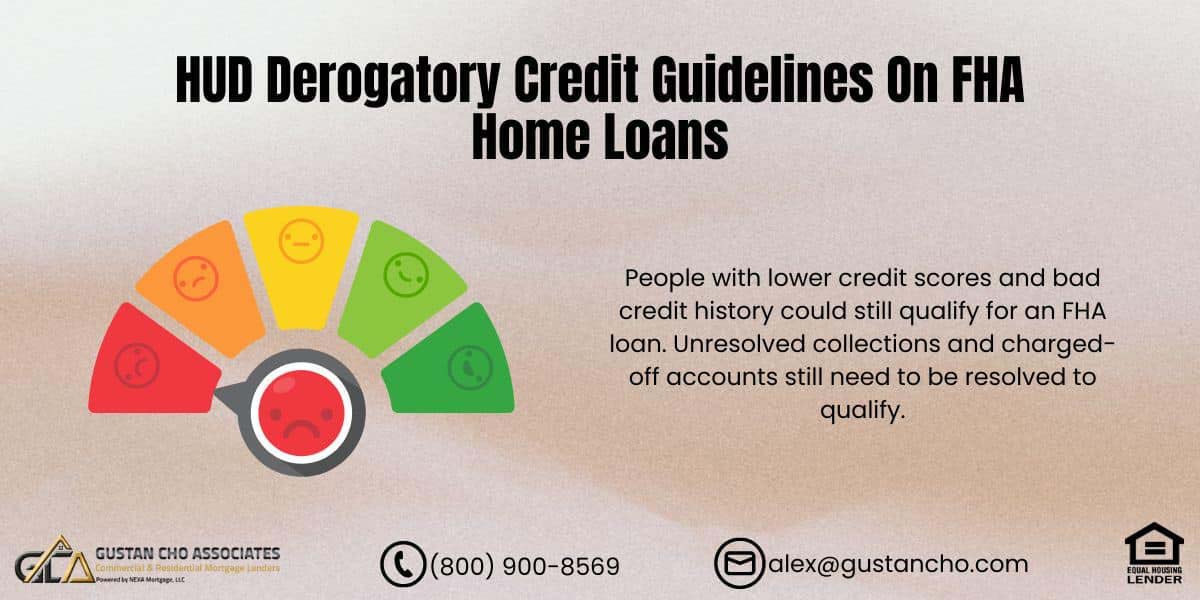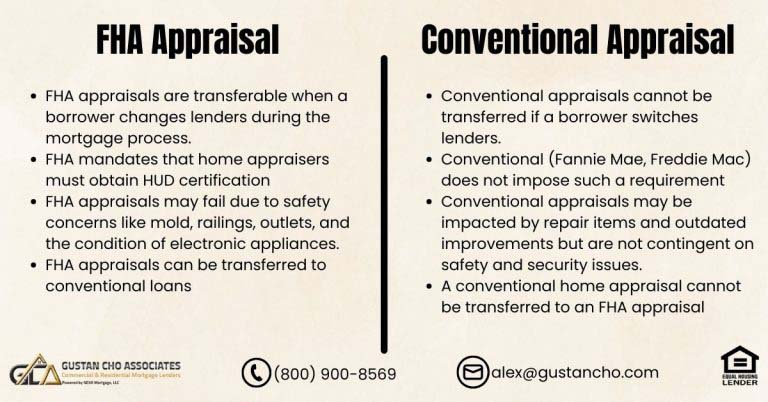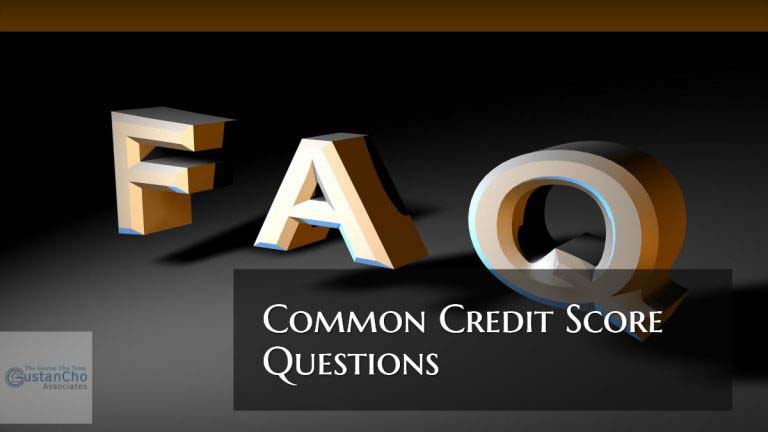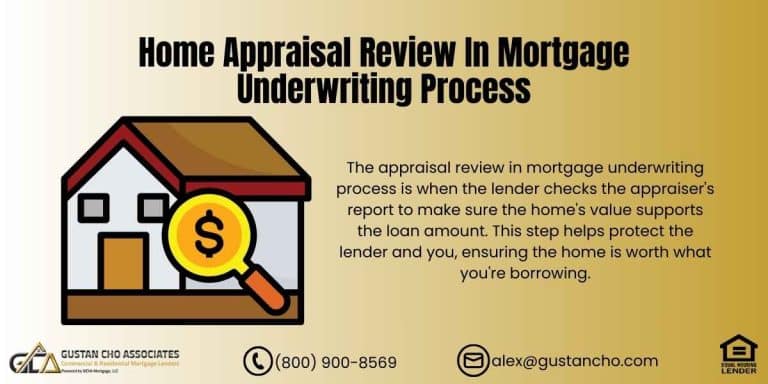This Article Is About HUD Derogatory Credit Guidelines On FHA Home Loans
HUD, the parent organization of FHA, is responsible for establishing and implementing HUD Agency Guidelines on FHA loans. HUD offers the most lenient mortgage agency guidelines compared to any other home loan program, allowing borrowers with lower credit scores and past bad credit to qualify for an FHA loan.
Under HUD Derogatory Credit Guidelines, you can have outstanding collections and/or charged-off accounts and still qualify for an FHA loan without paying them off. Borrowers with prior bad credit, late payments, and other derogatory credit tradelines can also qualify for an FHA loan.
However, the key to obtaining an approved/eligible status through the automated underwriting system is to have made timely payments over the past 12 months. This article will discuss qualifying for an FHA loan with derogatory credit and compare HUD Agency Guidelines to other loan programs.
HUD Derogatory Credit Mortgage Guidelines Versus Lender Overlays
A lender must meet the minimum HUD Guidelines for FHA Loans. Still, mortgage companies can impose additional lender overlays at their discretion. In this section, we will discuss the minimum HUD Derogatory Credit Guidelines compared to typical lender overlays imposed by lenders on FHA loans.
The minimum FICO score needed to qualify for an FHA Home Purchase Loan with a 3.5% down payment is 580. However, many lenders have extra criteria, requiring credit scores between 620 and 640. People with FICO scores between 500 and 580 can still be eligible for FHA Loans by putting down a 10% payment.
Most lenders do not accept borrowers with credit scores below 580. However, Gustan Cho Associates is one of the few lenders that accept borrowers with credit scores as low as 500 FICO. Additionally, outstanding collections and charged-off accounts do not need to be paid off to qualify, even though many lenders will require these debts to be settled despite HUD Guidelines not mandating it.
Worried About Your Credit History? Learn How HUD’s Derogatory Credit Guidelines Affect Your FHA Loan!
Contact us today to understand HUD’s guidelines and find out how you can still qualify for an FHA loan.
What Does FHA Consider as Derogatory Credit?
The Federal Housing Administration (FHA) considers the following as derogatory credit:
- Late Payments: Missed payments on credit accounts, particularly those made within the last 12 months, are seen as derogatory.
- Bankruptcies: After Chapter 7 and Chapter 13 bankruptcy, which are viewed as negative credit incidents, a waiting period is usually required before an FHA loan can be obtained. Chapter 7 bankruptcy typically remains on the credit report for two years after discharge, while Chapter 13 bankruptcy lasts one year after filing with court approval.
- Foreclosures: A foreclosure is a significant derogatory event. FHA typically requires a three-year waiting period from the foreclosure date before a borrower is eligible for an FHA loan.
- Short Sales: Selling a property for less than the amount owed on the mortgage, known as a short sale, is also viewed negatively. Generally, there is a three-year waiting period after a short sale.
- Collections and Charge-Offs: Accounts that have gone into collections or been charged off are seen as derogatory. While small collections may not severely impact loan eligibility, larger or more recent ones can.
- Judgments: Any outstanding judgments must typically be paid off, or a satisfactory payment arrangement must be in place before loan approval.
- Tax Liens: Federal tax liens must be resolved, and an acceptable repayment plan must be in place to be eligible for an FHA loan.
- Serious Delinquencies: Repeated delinquencies on various accounts can be seen as derogatory, particularly if they indicate a pattern of financial irresponsibility.
The FHA examines the entire credit profile and may consider the reasons for derogatory credit events and the efforts made to rebuild good credit. Borrowers with adverse credit histories can still be eligible for an FHA loan under HUD Derogatory Credit Guidelines, provided they demonstrate compensating factors such as a steady employment history, sufficient income, and a larger down payment.
HUD Derogatory Credit Mortgage Guidelines on Manual Underwriting
Not all lenders are open to manual underwriting for VA or FHA loans. Late payments within the previous 12 months may not be prohibitive if the borrower can obtain an approve/eligible status through the automated underwriting system (AUS) as per the HUD Derogatory Credit Guidelines. However, to qualify for manual underwriting on FHA loans, borrowers must have made timely payments for the past 12 months.
Borrowers can qualify for FHA loans during Chapter 13 repayment with trustee approval. However, many lenders prefer a discharge before considering the application. After completing a Chapter 13 Bankruptcy, no waiting period is required to be eligible for FHA loans. However, certain lenders might require a waiting period of one to two years following the bankruptcy discharge.
HUD Derogatory Credit Mortgage Guidelines on Judgments and Tax-Liens
Borrowers with judgments and tax liens do not have to pay the derogatory items to qualify for FHA loans. Borrowers with judgments and tax liens can get a written payment agreement with the judgment creditor or IRS and set up a minimum monthly payment plan. Three months of payments need to be made.
After the borrower can provide three months of canceled checks or bank statements, the borrower can qualify for an FHA loan. Borrowers can also negotiate with the judgment or Internal Revenue Service for a lesser amount than the face value of the judgment or tax lien. It needs to be on paper.
Once payment is made on the negotiated settlement, they can qualify for an FHA loan. The negotiated payment on the judgment or IRS tax lien can be paid to the title agent at closing. Per HUD derogatory credit mortgage guidelines, HUD is the only federal agency that allows borrowers with federal tax lien to be eligible for FHA loans.
You can qualify for conventional loans with outstanding tax debts with a written payment agreement with the Internal Revenue Service. However, Fannie Mae and Freddie Mac does not allow borrowers with an executed tax lien to be eligible for conventional loans. For more information on this article or other mortgage-related topics, please contact us at Gustan Cho Associates at 800-900-8569 or text us for a faster response. Or email us at gcho@gustancho.com.
Have Derogatory Credit? Let Us Help You Navigate HUD’s FHA Guidelines for Loan Approval!
Reach out today to learn how HUD’s derogatory credit guidelines can help you get back on track toward homeownership.
Qualifying For An FHA Loan With Outstanding Judgments And Tax Liens
Borrowers can qualify for an FHA loan with outstanding judgments as long as they have a written payment agreement with the judgment creditor. The borrower needs to have three months of history paying on their judgment per the written payment agreement. HUD allows borrowers with outstanding tax liens to qualify for an FHA loan.
A written payment agreement and three months of payment seasoning on the agreed-upon monthly payment are required. This is not the case with conventional loans. Fannie Mae and Freddie Mac allow borrowers with outstanding tax debts to qualify for a conventional loan. However, it cannot be a tax lien. The borrower needs to make one payment to the IRS per the written payment agreement to qualify for a conventional loan.
About The U.S. Department Of Housing And Urban Development
The United States Department of Housing and Urban Development (HUD) is the parent of the Federal Housing Administration (FHA). HUD has very lenient guidelines on credit and debt to income ratio. HUD Derogatory Credit Guidelines allow for borrowers with prior bad credit to qualify for FHA Loans.
Under HUD Derogatory Credit Guidelines, borrowers with outstanding collections and charge-offs can qualify for FHA Loans without having to pay them off. Under HUD Derogatory Credit Guidelines, borrowers can have bad credit and low credit scores to qualify and get AUS Approval. However, borrowers need re-established credit and timely payments in the past 12 months to get an approve/eligible per automated underwriting system. FHA Manual Underwriting Guidelines require timely payments in the past 24 months.
HUD Derogatory Credit Guidelines Versus Lender Overlays
All lenders do not have the same FHA lending requirements.
- All lenders need to meet minimum HUD Mortgage Guidelines.
- However, lenders can have their own additional FHA Lending Requirements called overlays.
- Under HUD Derogatory Credit Guidelines, borrowers do not have to pay outstanding collections and charge off accounts to qualify for FHA Loans.
- However, a lender may require all outstanding collections and charge off accounts to be satisfied
- This is often the case with many banks.
- Same with credit scores.
Minimum Credit Score Requirements On FHA Loans
Under HUD guidelines, the minimum credit score to qualify for 3.5% down payment FHA Loans is 580 FICO. The minimum credit score required to qualify for an FHA loan is 500 FICO. However, if the borrower has lower than 580 credit scores, a 10% down payment is required versus a 3.5% down payment.
However, many lenders normally have higher credit score requirements. All lenders need to meet the minimum HUD Agency Guidelines on credit score and other lending requirements. However, lenders are allowed to require higher lending requirements.
These higher lending requirements by lenders is called lender overlays. Most banks have credit score overlays of 640 FICO. Other mortgage lenders have 620 credit score requirements. All bad credit borrowers need to meet HUD Derogatory Credit Guidelines. Gustan Cho Associates has no overlays on FHA Loans. We just go off automated underwriting system findings.
HUD Mortgage Guidelines To Qualify For FHA Loans
Here are basic HUD Mortgage Guidelines To Qualify For FHA Loans:
- To qualify for 3.5% Down Payment FHA Loans, borrowers need to have at least 580 FICO
- Borrowers under 580 FICO down to 500 credit scores are eligible to qualify for FHA Loans with a 10% down payment
- All borrowers need to get an approve/eligible per automated underwriting system
- Borrowers with referred/eligible per automated underwriting system findings can qualify for FHA Manual Underwriting
- Outstanding collections and charge offs do not have to be satisfied
- Borrowers can qualify for FHA Loans with outstanding judgments and tax-liens
- However, borrowers need a written payment agreement with the judgment creditor and/or IRS
- Three months of payments need to have been made
- Lenders need to see three months of canceled checks and/or bank statements made to the judgment creditor and/or IRS
- The two-year waiting period after Chapter 7 Bankruptcy discharged date to qualify for FHA Loans
- The three-year waiting period to qualify after foreclosure, deed in lieu of foreclosure, short sale
- Borrowers in an active current Chapter 13 Bankruptcy Repayment Plan can qualify one year into the repayment plan with Trustee Approval
- Chapter 13 Bankruptcy does not need to be discharged to qualify for FHA Loans
- There is no waiting period to qualify after the Chapter 13 Bankruptcy discharged date
Over 75% of our borrowers at Gustan Cho Associates are folks who could not qualify at other lenders due to lender overlays. Gustan Cho Associates is one of the very few lenders licensed in multiple states with no lender overlays on FHA, VA, USDA, and Conventional loans.
HUD Derogatory Credit Guidelines: Medical Versus Non-Medical Collections And DTI Calculations
FHA does not require outstanding collections and charge offs to be satisfied. However, with non-medical collections with sums over $2,000, HUD requires lenders to take 5% of the outstanding collections and use it as a monthly hypothetical debt for DTI Calculations. This is only on non-medical collections.
Medical collections and charged-off accounts are exempt from this 5% rule. There is no maximum amount of outstanding collections and/or charge off accounts. Borrowers can qualify for FHA Loans no matter how large the outstanding collections and the charged-off amount is.
Ready to Buy a Home with Derogatory Credit? Learn How HUD’s FHA Guidelines Can Help!
Reach out today to find out how you can qualify for an FHA loan despite past credit challenges.
Can You Have Disputes on Credit with an FHA Loan?
When applying for an FHA loan, disputes on your credit report can complicate the approval process. Accounts with a zero balance that are in dispute typically do not affect loan approval. However, disputed accounts with a balance can pose a problem. FHA lenders usually require these disputes to be resolved before proceeding with the loan.
This includes removing dispute notations or settling the disputed balances. Medical collections in dispute are generally treated more leniently. Still, other types of disputed derogatory accounts must be addressed, such as those with late payments or charge-offs.
Addressing any credit report disputes before applying for an FHA loan is important to increase your chances of getting approved for a loan. This might involve discussing with creditors to settle outstanding balances or removing dispute remarks from your credit report. Working closely with your lender to understand their specific requirements for disputed accounts is beneficial.
Also, checking your credit reports from all three major credit bureaus (Equifax, Experian, and TransUnion) in advance to identify and resolve any remaining disputes is helpful. Following these steps can help ensure a smoother approval process for your FHA loan.
Qualifying With A Lender With No Lender Overlays On HUD Derogatory Credit Guidelines
Borrowers who need to qualify for FHA Loans with derogatory credit, please contact us at Gustan Cho Associates at 800-900-8569 or text us for a faster response. Or email us at gcho@gustancho.com. We are available 7 days a week, evenings, weekends, and holidays.
FAQs: HUD Derogatory Credit Guidelines On FHA Home Loans
- 1. What are HUD’s guidelines for FHA loans? The organization supervising FHA and HUD provides more lenient mortgage criteria than other loan programs. People with lower credit scores and bad credit history could still qualify for an FHA loan. Unresolved collections and charged-off accounts still need to be resolved to qualify.
- 2. What credit score is required for an FHA loan? A FICO score of at least 580 is typically required for an FHA mortgage with a 3.5% down payment. If your credit score falls within the range of 500 to 579, you may still be eligible for a 10% down payment. However, it’s important to note that many lenders may impose additional conditions and require higher credit scores.
- 3. What is considered derogatory credit by the FHA? The FHA considers late payments, bankruptcies, foreclosures, short sales, collections, charge-offs, judgments, tax liens, and repeated delinquencies derogatory credit events. These factors can impact loan eligibility, especially if they occurred within the last 12 months.
- 4. Can I qualify for an FHA loan with outstanding judgments or tax liens? Borrowers can be eligible for an FHA loan even if they have outstanding judgments or tax liens if they have a documented payment agreement with the creditor or IRS and have made payments for three months. Proof of the payment history is necessary.
- 5. How does manual underwriting work for FHA loans? Manual underwriting is an option for borrowers who need to receive an approved/eligible status from the automated underwriting system (AUS). To qualify, borrowers must have made payments in a timely manner over the past 12 months. Chapter 13 bankruptcy filers can qualify during the repayment plan with trustee approval.
- 6. What are lender overlays, and how do they affect FHA loan eligibility? Lender overlays encompass extra conditions individual lenders establish in addition to the basic HUD guidelines. These may involve elevated credit score prerequisites or the necessity to settle outstanding collections and charge-offs. Lenders do not all have identical overlays, so exploring different options is crucial.
- 7. Can disputes on my credit report affect my FHA loan application? Yes, disputed accounts with a balance can complicate the approval process. FHA lenders typically require these disputes to be resolved before proceeding with the loan. Accounts with a zero balance in dispute are usually not an issue.
- 8. How can I improve my chances of qualifying for an FHA loan with derogatory credit? To improve your chances, ensure all credit disputes are resolved, maintain timely payments for at least 12 months, and provide thorough documentation of any extenuating circumstances. Working closely with a lender with no FHA loan overlay can also help.
For more information or assistance, contact Gustan Cho Associates at 800-900-8569 or email gcho@gustancho.com.
This blog about HUD Derogatory Credit Guidelines On FHA Home Loans was updated on May 30th, 2024.
Dealing with Derogatory Credit? Let Us Help You Qualify for an FHA Loan Under HUD’s Guidelines!
Contact us today to explore your FHA loan options and get started on your journey to owning a home.










